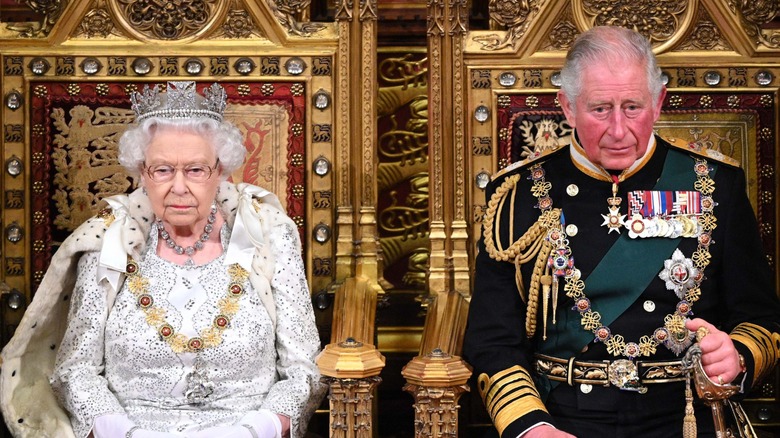The Royal Family's History Of Cancer Reports Explained
Buckingham Palace revealed on February 5, 2024, that King Charles III was diagnosed with cancer. Although the diagnosis followed Charles' operation for an enlarged prostate, the Palace released a statement that said "a separate issue of concern" prompted additional testing, implying that it is not prostate cancer. There's been no confirmation on what type of cancer Charles was diagnosed with. He is not the only member of the royal family with a history of cancer, however.
Queen Elizabeth II died in September 2022. Two months after that, excerpts of Gyles Brandreth's book "Elizabeth: An Intimate Portrait" were shared online and included speculation that she was struggling with bone marrow cancer. "I had heard that the Queen had a form of myeloma — bone marrow cancer — which would explain her tiredness and weight loss and those 'mobility issues' we were often told about during the last year or so of her life," Brandreth wrote.
Brandreth's heartbreaking claims also had details on what bone marrow cancer entails, primarily "bone pain." He also mentioned treatment options. However, it does not seem like Buckingham Palace ever confirmed the speculation that Queen Elizabeth had or died of cancer. Her death certificate cited merely "old age" as the cause.
Elizabeth's father had cancer, and her husband was speculated to have it as well
Queen Elizabeth II's father, King George VI, had cancer himself. Fans of Netflix's "The Crown," the series that explores Queen Elizabeth's life, may remember that King George's poor health and death were a major plot point in Season 1 (since that led to Elizabeth taking the throne). King George's cause of death was coronary thrombosis, or a blood clot in an artery, but he also had lung cancer — likely due to a history of smoking.
King George had lung surgery due to "structural changes" in 1951 (via BBC News). It is believed that the surgery had to do with his cancer diagnosis, but details are hard to nail down due to the limited information available.
Queen Elizabeth's husband, Prince Philip, was also reported to have cancer back in 2008. It was speculated he had prostate cancer. However, Buckingham Palace shared a statement debunking an article in The Evening Standard about the so-called cancer diagnosis. They wrote how "a right to privacy" is why they do not discuss reports about royals' health. They continued, "We will continue to observe this long-standing practice; but on this occasion, because the damaging story is now being reported widely, The Duke of Edinburgh has authorised us to confirm that the claim made by the Evening Standard that he has received a 'diagnosis of prostate cancer' is untrue." The Evening Standard published an apology afterward.
The Duchess of York announced a cancer diagnosis shortly before the king
King Charles III's cancer diagnosis is sadly not the only one a member of the royal family has received in early 2024. On the heels of her breast cancer recovery, Prince Andrew's ex-wife Sarah Ferguson announced a new heartbreaking diagnosis: melanoma, the worst form of skin cancer. The news was shared on January 21, 2024, a few days after the surgeries of Catherine, Princess of Wales, and King Charles were announced to the public.
Similar to how Charles' cancer was discovered along with a medical procedure for something different, the Duchess of York's malignant mole was discovered while she was in the process of breast reconstruction surgery. In a statement, a spokesperson said, "The Duchess wants to thank the entire medical team which has supported her, particularly her dermatologist whose vigilance ensured the illness was detected when it was" (via The Sun). Sarah hoped the news of her diagnosis would inspire others to keep an eye out for any abnormal-looking moles of their own.
It seemed she did just that. The Sun reported that approximately eight times as many people visited the NHS webpage on skin cancer in the days following Sarah's announcement.


